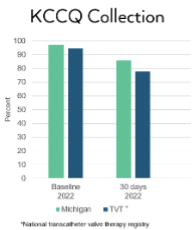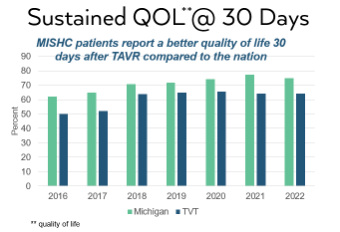
| |||
|
Improving Quality of Life for Patients with Heart Valve Replacement A multiyear initiative results in more complete and higher quality documentation of heart valve replacement patient experiences and outcomes. While the idea of “quality of life” may differ among patients, the idea is the same for interventional cardiologists and cardiac surgeons who perform transcatheter aortic valve replacement, or TAVR: to help patients live longer, fuller, higher quality lives. The Michigan Structural Heart Consortium saw an opportunity to advance that goal though a quality improvement initiative aimed at improving and utilizing data from the Kansas City Cardiomyopathy Questionnaire, a validated 23-item patient-reported health status measure that quantifies physical limitations, symptoms, self-efficacy, social interference and quality of life. MISHC collaborated with TAVR hospitals across Michigan to improve collection and documentation of the KCCQ. KCCQ is administered before the procedure, again after 30 days and one year after the procedure. Pre-TAVR, the KCCQ is used for patient selection and risk assessment. The post-TAVR KCCQ provides a patient-assessed response to treatment and a more complete picture of patient outcomes. MISHC began the initiative by tracking and reporting KCCQ completion rates among participating hospitals. This led to instituted goals and educational opportunities for hospitals. 
The result of these efforts was an increase in documentation of the KCCQ at all points in time, which exceeded the national rates of data collection (Figure 1). Due to the higher rates of KCCQ documentation, MISHC can more accurately detect changes in the KCCQ summary score — a value indicating survival with sustained quality of life (Figure 2). The result for Michigan was a more than 10-point increase on the KCCQ summary score from baseline to 30-day follow-up. MISHC hospitals saw a 21% increase in the KCCQ summary score from 2016 through 2022. While national rates improved similarly from 2016 through 2022, Michigan remains higher than the national rates on the KCCQ summary score. About MISHC MISHC is a quality improvement project designed to improve quality of care and patient outcomes for patients in Michigan who undergo transcatheter valve procedures. MISHC reports data on TAVR, transcatheter mitral valve replacement, or TMVR, and transcatheter edge-to-edge repair, or TEER. Over 130 cardiologists and heart surgeons from 30 hospitals across Michigan collaborate in MISHC. This leads to data collection on approximately 3,000 procedures annually, therefore, improving care for this specialty, which costs an estimated $140 million each year in Michigan. MISHC is a collaboration between the Michigan Society of Thoracic and Cardiovascular Surgeons Quality Collaborative and the BMC2 Cardiovascular Consortium. Support for MISHC is provided by Blue Cross and Blue Shield of Michigan and Blue Care Network as part of its Value Partnerships program. Although Blue Cross and BMC2 work collaboratively, the opinions, beliefs and viewpoints expressed by the author don’t necessarily reflect the opinions, beliefs and viewpoints of Blue Cross or any of its employees. More about the survey Visit CV Outcomes to learn about the KCCQ measure. More about the CQIs To learn more about BMC2, visit bmc2.org. For more information on the CQIs and other Value Partnerships programs, visit valuepartnerships.com. | ||||
Blue Cross Blue Shield of Michigan and Blue Care Network are nonprofit corporations and independent licensees of the Blue Cross and Blue Shield Association. |

